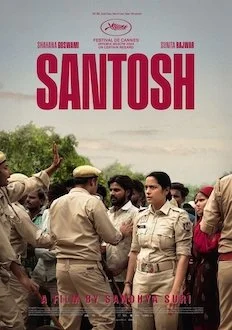Direction: Sandhya Suri
Country: India
Following two documentaries (I For India, 2005; Around India With a Movie Camera, 2018), British-Indian writer-director Sandhya Suri delivers a terrifying portrait of contemporary India in her fictional feature debut, Santosh. The film, grounded in stark realism, begins as a poignant social drama before evolving into a gripping political thriller.
The story follows Santosh Saini (Shahana Goswami), a 28-year-old widow who assumes her late husband's position in the police under the government’s “compassionate appointment” scheme.Her first assignment is to investigate the rape and murder of a 15-year-old Dalit girl, under the supervision of the tough, cynical, and feminist Inspector Geeta Sharma (Sunita Rajwar), a staunch enforcer who condones police brutality.
As a work of urgent conviction, Santosh embraces deliberate neo-noir tones, and is heavy on atmosphere and unhurried in its development. The main character initially jubilates with her desire for freedom, only to confront the deeply embedded social ills of modern India: a rigid caste system, the demonization of Muslims, femicide, systemic corruption, and toxic patriarchy.
Suri opts for restrained emotional expression, emphasizing careful staging and precise framing to reinforce each dramatic intention. Goswami and Rajwar deliver immaculate performances, exploring the gray zones of human nature and the moral complexity faced when confronting brutal injustices. It’s impossible to deny that Santosh is thoroughly good, offering an unsettling but imperative viewing.






























